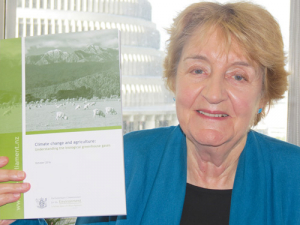No one immediate solution is available to New Zealand to deal with the problem of greenhouse gas emissions caused by agriculture.
So says the parliamentary commissioner for the environment, Dr Jan Wright, in a new detailed report on the complex science issues and the solutions now being researched. The 100-page report does not point the finger or blame anyone in particular, but factually presents the science challenges and how these can be solved by scientists and implemented practically by farmers.
The problems, says Wright, are well known and relate to methane and nitrous oxide -- methane occurring in the rumen of cattle, sheep, goats and deer, and nitrous oxide mainly in urine deposited in the soil by animals
Potential solutions flagged are planting more trees, a vaccine to deal with the methanogens which cause methane in the rumen of animals, breeding animals that produce less methane and forages/grasses that reduce methane and nitrous oxide. But Wright insists none of these individually -- apart from tree planting -- will promptly solve the problem.
Wright points to examples of NZ farmers who have already moved to reduce emissions by reducing stock numbers but still retaining profitability. Examples mentioned are Lake View Farms near Hamilton and the Bartons near Taupo.
The report, intended to promote discussion, seeks to get a clear picture of the science out into the public domain; it not designed to blame, Wright says, because this doesn’t help.
“Certainly dairy is implicated in water quality issues because of the way in which cows urinate, although I would always say that the sediment-phosphate part of the equation really goes back to sheep. Nitrous oxide is of concern in all ruminants; yes, a cow will produce more than a sheep because it is a bigger animal but it is also producing more protein. This is about all the ruminants which belch methane.”
The report is aimed at keeping in mind the target of NZ having a low carbon economy.
Wright notes that NZ is among the highest greenhouse gas emitters per capita because we are a food producer.











